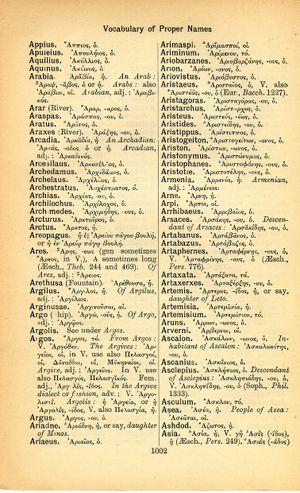Aratus
καλῶς γέ μου τὸν υἱὸν ὦ Στιλβωνίδη εὑρὼν ἀπιόντ' ἀπὸ γυμνασίου λελουμένον οὐκ ἔκυσας, οὐ προσεῖπας, οὐ προσηγάγου, οὐκ ὠρχιπέδισας, ὢν ἐμοὶ πατρικὸς φίλος → Ah! Is this well done, Stilbonides? You met my son coming from the bath after the gymnasium and you neither spoke to him, nor kissed him, nor took him with you, nor ever once felt his balls. Would anyone call you an old friend of mine?
English > Greek (Woodhouse)
Ἄρατος, ὁ.
Latin > English (Lewis & Short)
Ărātus: i, m., = Ἄρατος.
I A Greek poet of Soli, in Cilicia, who fl. B. C. 250; author of an astronomical poem, entitled Φαινόμενα, which Cicero, and afterwards Caesar Germanicus, translated into Latin, Cic. de Or. 1, 16, 69; id. Rep. 1, 22, 56; id. N. D. 2, 41; Ov. Am. 1, 15, 16; Stat. S. 5, 3, 23 (Ărătŭs, Paul. Nol. Carm. 19, 125; Sid. Carm. 23, 112).—
II Aratus of Sicyon, a distinguished Greek general, founder of the Achœan League, Cic. Off. 2, 23, 81 (v. his life written by Plutarch).
Latin > French (Gaffiot 2016)
(3) Ărātus,¹⁴ ī, m.,
1 poète grec, auteur des Phénomènes, trad. par Cicéron : Cic. de Or. 1, 69

